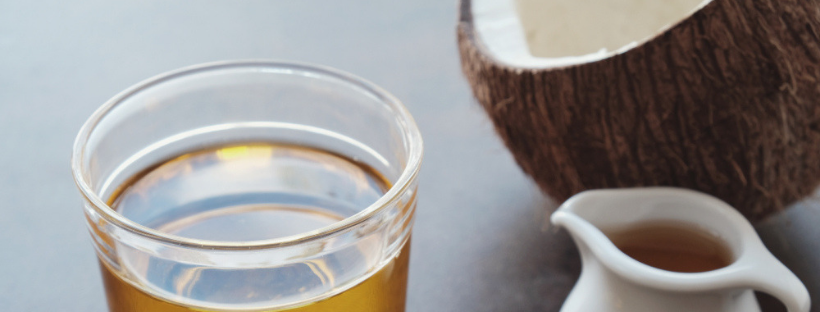MCT oil is more than just another buzzword in the world of nutrition. In fact, MCT oil is one of the most bioavailable sources of energy available to us.
MCT oil is made through the extraction of medium-chain triglycerides (MCTs) from different foods — mainly from coconut and palm oil. MCTs are partially man-made fats.
Research suggests MCT oil has several potential health benefits. For example, it can support brain health, healthy weight loss, boost energy levels, help control food cravings, and bolster digestive health.
On the ketogenic diet, MCT oil can increase ketone production effectively and thus quickly boost energy levels.
In this article, we explain everything you need to know about MCT oil, its potential benefits, safety and side effects, and how it’s made.
What is MCT Oil?
As mentioned, MCT oil stands for medium-chain glycerides. You may also find them under the name MCFAs (medium-chain fatty acids).
The “medium” name derives from the fact that hey only have 6-10 carbon atoms.
MCT oil belongs to the group of saturated fatty acids. It can be an effective source of energy because the aforementioned glycerides don’t need other enzymes to effectively absorb into the body.
MCT oil has plenty of medical benefits. It can be used to treat food absorption disorders, high levels of cholesterol, rare lung conditions, Alzheimer’s disease, and epilepsy among many others.
Athletes incorporate MCT oil for nutritional support during exercise to improve their physical performance and to increase lean muscle mass while effectively cutting fat.

How is MCT Oil Made?
MCT oil is a blend of two MCTs: caprylic and capric acids. As mentioned, MCT oil is a man-made product.
Scientists use these two fatty acids because they show the highest absorption rate and turn into energy much faster compared to the other MCTs.
Natural foods simply don’t have sufficient concentrations of these fats, and when they occur there, they’re usually present among less efficient fats, such as lauric acids. This significantly slows down the metabolism of MCT fats.
Despite being a man-made product, MCT oil contains naturally occurring fats. The MCTs are extracted from MCT-rich foods. The most popular sources of MCTs include coconut oil and palm kernel oil.
This is a simplified process of making MCT oil:
- Step 1: obtaining high-quality coconut oil
- Step 2: Fractionation of the oil to extract caprylic and capric acids, and separate them from the remaining fats.
- Step 3: Lipase Esterification. This process involves the production of triglycerides with the use of an enzyme called lipase.
- Step 4: Lipase gets removed through filtration
- Step 5: Deacidification
- Step 6: MCT oil gets bleached
- Step 7: Packaging
- Step 8: Lab analysis
- Step 9: Finished MCT oil
MCT oil typically contains about 50-80% caprylic acid and 20-50% capric acids, although they could also be comprised only of one of these MCTs.
Why is MCT Oil One of the Best Sources of Energy?
Once you enter the state of ketosis, your body starts to use ketones as its main source of energy instead of glucose that comes from carbs.
MCT oil spurs the production of ketones and it makes them readily available for your body to use. This, in turn, makes ketosis easy to achieve and maintain.
Because MCTs are efficiently burned, MCT oil has two positive effects on your metabolism:
- Your body is less likely to store MCT oil as body fat. MCTs are almost immediately metabolized and used as a fuel.
- You can achieve a better thermogenic effect. This results in higher calorie burn and a significant metabolism boost.
Wondering what’s the “why” behind such effects of MCT oil?
Here are 4 reasons why the oil can benefit your weight loss:
- MCTs are quickly metabolized by the liver because they don’t have to pass through peripheral tissues, like LCTs doo.
- MCTs can be absorbed efficiently by the body due to the size of their carbon links. MCTs
- MCTs can breach the double membrane of the mitochondria much faster than other fats.
- Unlike LCTs, MCTs don’t need carnitine to be used as a source of energy.
Long story short, MCT oil is more bioavailable than other fats because it calls for fewer steps to be metabolized in your cells. What you end up with is a healthy and efficient fuel for your body and brain.

6 Health Benefits of MCT Oil
MCT oil comes with a plethora of benefits, most of which are focused around the digestive health and metabolism.
Here are 6 science-backed health benefits of MCT oil:
1. Allows You to Lose Weight in a Healthy Way
Fats have always been known to be a better source of energy than carbs. They help you stay fuller for hours, but there’s way more to MCT oil than just maintaining satiety.
Numerous studies have shown that MCT oil can help in raising the metabolic rate at which the body functions. This leads to a steady yet healthy weight loss (1) (2) (3)
A double-blind placebo study published in the Journal of Nutrition concluded that a group consuming MCTs can significantly increase the metabolism of an individual compared to LCTs (long-chain triglycerides) (4).
The study involved a group consuming LCTs and the other group of individuals taking LCTs — with no differences in other eating habits.
After testing the subjects for 12 weeks, the researchers found that there was about 8,5 lbs difference in overall body fat loss. The study suggests that MCTs could prevent fat accumulation through improved thermogenesis and the oxidation of fat.
In conclusion, MCTs can support healthy weight loss because they keep you fuller for longer, so you don’t have to eat that much food throughout the day. On top of that, they don’t get stored as fat; instead, they are immediately used by the body to produce energy and boost metabolism.
2. Aids Digestive Health
MCTs have natural antibiotic properties and can inhibit the growth of certain types of dangerous bacteria — or even destroy them. All of this without decreasing the levels of “good” bacteria.
This provides your gut with a better environment in which it can metabolize the food and any consumed active ingredients without overburdening your liver and pancreas. With a decent bacterial profile, your gut is also protected against fungi and other parasites.
Research has shown that MCTs can be effective at killing harmful bacteria such as Neisseria, staphylococcus, and streptococcus, all of which can spread viruses inside the body.
The health of your digestive system affects everything from your ability to absorb nutrients, vitamins, and minerals to energy capacities and cognitive functioning, so it’s paramount to support it with healthy fats such as MCTs contained in MCT oil (5).

3. Improves Cognitive Performance
The unique connection between the brain and gut has recently become a hot subject of discourse in the medical community.
Our brains are mostly comprised of fatty acids, so it should come to nobody’s surprise that we think more effectively and can get more energetic and creative when consuming MCT oil and other healthy fats.
Ketones can pass through the blood-brain barrier to fuel the central nervous system, which is a good indicator of MCT oil’s positive influence on brain health.
According to a study published in Front Aging in Neuroscience, patients suffering from memory impairment showed improvement in memory performance after taking MCT oil that increased their ketone levels in the blood (6).
Last but not least, MCTs have been shown to have a significant blood sugar stabilizing effect that may help curb inflammation and improve brain health (7).
4. Protects the Heart Against Disease
Aside from being natural antibiotics for immune and gut health, MCTs can potentially aid the prevention and treatment of cardiovascular disease.
A study published in the European Journal of Clinical Nutrition recorded a significant drop (-14.54%) in blood triglyceride levels — a common marker of cardiovascular issues — in hypertriglyceridemic subjects who were administered MCT oil compared to the group which consumed LCT oil (8).
Another study published in the Journal of Nutrition has further supported the above findings indicating that administering MCTs to overweight men lead to improvements in general lipid profiles. More importantly, the researchers noted a significant increase in HDL particle, the so-called “good cholesterol.” (9)
Finally, a study from the journal of Metabolism suggests that overweight women incorporating MCT oil into their diet scored a lower risk of cardiovascular disease. However, the study also used omega-3 fatty acids and phytosterols, so the evidence may not be conclusive in this case (10).
5. Proves Helpful for Managing Diabetes
The MCTs in MCT oil are a possible mean of prevention and treatment of diabetes. As shown by several studies published in the Journal of Diabetes and the Journal of Metabolism, MCT consumption can improve insulin sensitivity — the most important factor in diabetes prevention in management — in both diabetic patients and healthy subjects (11) (12).
In addition, MCT oil is a promising supplement for Type 1 diabetes sufferers. According to a small study from the American Diabetes Association, ingesting MCT oil can prevent cognitive impairment during hypoglycemia in Type 1 diabetes patients. The strongest effects of MCTs were recorded in verbal memory (13).
6. Promotes Better Exercise Habits
MCTs have successfully become a standard go-to supplement in the diets of both recreational and professional athletes. It’s no wonder that active people choose to incorporate MCT oil in their supplementation plan, as MCTs are rapidly absorbed by the body and can quickly turn into a sustainable source of energy.
As research in this area continues, scientists are discovering new interesting facts about the use of MCT oil in sports. For example, a fairly recent study from the Journal of Nutritional Science and Vitaminology showed that amateur athletes using MCTs have significantly reduced blood lactate levels and rate of perceived exertion (RPE) during low-to-moderate intensity workouts. The duration of high-intensity exercise, however, is increased when consuming MCT oil (14).
Another academic paper from the Journal of Applied Physiology explained the benefits of MCTs on physical performance in professional athletes. The study examined endurance-trained cyclists who took MCTs during moderate-intensity training over the course of two hours, followed by a time trial during high-intensity exercise. The results showed significant improvements in time-trial performance during the high-intensity workouts after continuous supplementation with MCT oil (15).
While the research on the benefits of MCT oil for athletes is still in its infancy, more an more people are turning to low-carb and high-fat diets due to the emerging evidence and thousands of testimonials from professionals.

How to Use MCT Oil
If you haven’t used MCT oil yet, it’s best to start off at small doses. Begin with one teaspoon of MCT oil per day and gradually increase your intake to get your body adjusted to the MCTs.
Once your body gets accustomed to the metabolization process, you can increase the dose to 1 tablespoon per day or whichever dose you deem effective. Since MCT oil lacks taste and smell, you can add it to almost anything — people typically add MCT oil to their homemade topicals or different foods and beverages.
Side Effects & Safety
MCT oil is considered safe and doesn’t come with any health-threatening adverse effects. Researchers are yet to find a lethal dose for MCT oil. So far, the maximum tested dosage was an equivalent to 1.7 cups of MCT oil for a 70kg individual — the oil was fed to rats.
It’s possible to experience diarrhea when consuming MCT oil in abundance without a previous adaptation period, but that’s the problem with almost all fats that are ingested at higher doses once a person decides to step off the high-carb diet and begin the high-fat regimen.
Moreover, MCTs can increase the release of hunger hormones in some people. A study on anorectic patients found that MCT oil increased the release of ghrelin and neuropeptide Y, two hormones responsible for stimulating appetite.
Subjects who exceeded a dose of 7 grams of MCTs per day produced more of these hormones than those who consumed 1 gram per day and less. However, scientists are divided whether the increase in these hormones actually causes you to eat more.
Final Thoughts on MCT Oil
MCT Oil offers plenty of health benefits and very few risks. To begin with, it contains fatty acids that can support weight loss by effectively reducing body fat, improving the gut environment, and increasing fullness.
MCTs contained in MCT oil are also a sustainable source of energy and may fight bacterial growth, protect your cardiovascular health, help in managing diabetes, improve brain health, and enhance cognitive performance.
Potential downsides to using MCT oil include increased release of hunger hormones and possible diarrhea after consuming too much of MCTs. Nevertheless, as long as you keep your intake of MCT oil in moderation and use it as a supplement to an already healthy diet, any adverse reactions are unlikely.
Do you include MCT oil in your supplementation plan? Did you notice any significant improvements in the above aspects of your life? Share your thoughts in the comments below!

